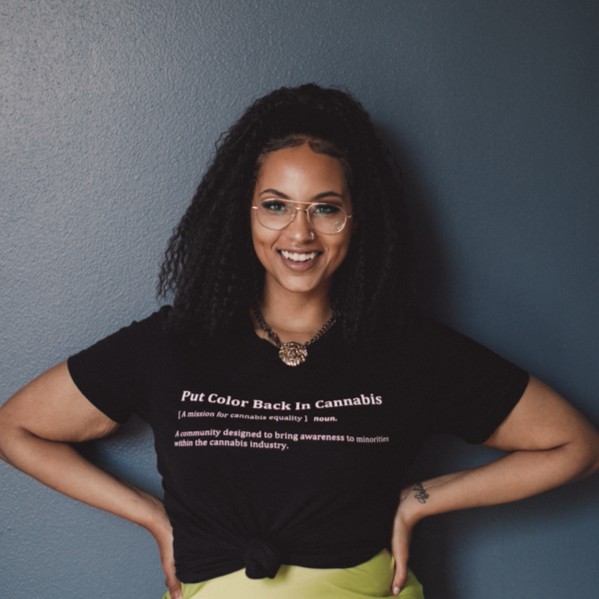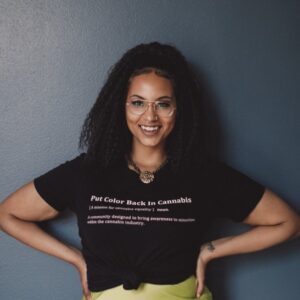
Social Equity: Putting Color Back in Cannabis

Scheri Mathaya is a powerhouse entrepreneur, working her way up the cannabis industry ladder and quickly discovering her path to social equity-related advocacy. When she first started in a position at Flow Kana, a popular sustainable cannabis brand and operator in California, she studied the plant fiercely and found herself in a Brand Educator role. Mathaya recognized another endeavor within the industry to pursue. Put Color Back in Cannabis is a cannabis-related racial justice project and brand focused on supporting minorities in the cannabis industry. Mathaya curates and sells cannabis-related apparel, including shirts and tote bags, sourced entirely from minority-owned manufacturers and vendors. The current goal of Put Color Back in Cannabis is to include minorities in the process of apparel curation, beginning from the source with manufacturing of clothing and accessories. For each product sold, Put Color Back in Cannabis donates a portion of profits to social equity funds and social justice causes. As her retail brand continues to grow, Mathaya has big plans in mind. We had the amazing opportunity to talk to Mathaya about her story and discuss why she started Put Color Back in Cannabis.
—
First, I just want to get to know you a bit better and how you got to where you are today?
I’m from Minnesota originally, but have been out in California since 2017. I have always loved the plant [cannabis] itself but was lacking education on the true benefits. Coming from places in the Midwest and places where it’s not yet legal, you really just have knowledge from using the plant but that’s it. I wanted to find a job where I could smoke weed, dress how I wanted, and get paid a good amount of money. So, when the opportunity came to move to California, I took advantage of it. I quickly realized I wanted to work in the cannabis industry and I wasn’t going to stop until I got there. I lived off of my savings for about two months, and ran out of everything. I happened to move there right around the time cannabis became legal in California and people needed a lot of help. Cannabis businesses needed bodies; they were willing to teach new people. That was my opportunity to get into the industry. I am still really blessed for that even now. Everybody needs one person who is willing to give them a chance on something that they don’t know, as long as you are willing to learn.
After 8 months of working as a budtender, I was asked if I wanted to advance a little bit more. That was really shocking and confusing to me honestly, because I didn’t know there were different levels and I was scared to lose my spot in the industry if it didn’t work out. But it did the opposite. It broadened me to the different processes and levels of the industry. To be honest, I don’t really want to leave the distribution side, unless it leans more towards social justice. I love the customer service part, but I like the mind work of figuring out what people want and getting people interested in the product. My resume is huge now from all the opportunities that I’ve had since working at Flow Kana.
Do you feel like moving towards retail is moving you away from the plant?
It’s taken me to a different level of the plant. When I first came out here I wanted to figure out the plant itself, and there is never a cap about how much you can learn about that. I did feel like I reached a good understanding of it, and could educate other people. But because I reached that level, I am looking for a different challenge, that’s where the social justice and education aspect comes in. Now that I have a grasp on what the industry is, I want to focus on educating others. Ending up in retail was accidental; it started really from a racist comment at a demo.
Can you tell me about the story of how Put The Color Back in Cannabis started?
I was in a shop in Oakdale, a predominantly white neighborhood, and someone came in. I did my normal routine of engaging with the customer and he just brushed me off as if I wasn’t there. It wasn’t the first time, so I just kind of moved on with my life and proceeded. I was talking to someone else and out of the corner of my eye I could see him showing interest and peeking over so I’d speak out a little louder so he could hear. As I was talking and finishing up with another person, he said, “I’m really surprised that someone like you really understands this.” And I said “What do you mean someone like me?” And he said “I don’t know, someone like your skin color, very educated” It was one of those things that hurt to hear the words, but it was also how nonchalant he was about saying those words. He was so casual. I really hated that moment. I found myself in my head, and I feel like a lot of us do – not just black or brown people but minorities in general when they are insulted on their race, especially at a job, they are put between a rock and a hard place. I had to ask myself, “Do I really let you know I feel as if we were in society and I wasn’t working?” or “Do I need to control myself, pretend I’m ok, and move on with my life?”
And also you don’t want to sound like “the angry minority stereotype” where everything you say just sounds defensive.
That’s exactly what it is. It’s really awful that being black and brown, you have the stigma of being “The angry black lady” — I’m just mad because of what you said. Let’s stop looking at the fact of my reaction and start looking at what created said reaction. I hate that when I’m expressing something in a louder tone or with more passion, that I’m “dramatic”. That’s not what it is. I’m pretty sure if someone else said the same words who has a lighter skin tone than me, it would be “assertive”. But I do want to speak up because if I don’t say something to him, it gives him permission to do it to someone else. Now that I’ve started my brand and worked more in social justice, if I could go back in time I would’ve said something to him. But I now use that experience as a learning experience and to help other people feel confident.
So, you told a friend what had happened, and then what was that conversation like?
We were smoking and I was venting about the whole story. She’s a white lady, who has a different privilege and hasn’t really faced this, but she has witnessed many people face it. She said, “It’s really shitty people disrespect you, in an industry created on your back.” And I remember telling her “we’ve just got to put the color back in cannabis.” Racism in the industry didn’t even occur to me until after that incident, I was in the industry for about a year and a half with not even having that on my mind. My mindset at first was all about the cannabis plant and then all of this happened, and I was like “wait this is happening around me everyday.” That’s why I speak about it so much, because we need to be aware of where this industry is lacking: social justice, racism, and equity.
We are in a really crazy position of seeing an industry start and progress slowly since legalization has to happen state by state. So we can change how the industry functions, since it hasn’t been legally established for long at all.
I completely agree. I always say every dispensary or delivery service should have one or two black-owned brands on their shelves, and people keep responding back “It’s hard, you can’t chase the money that way” and I think nothing in life worth supporting is easy at the end of the day. So what is more valuable to you?
What are your big goals for Put Color Back in Cannabis?
My website for sure. I want to have a directory of black-owned dispensaries, delivery services, and brands. I also want to make sure in my next round of profits, that part of it is going to benefit the community. So I either want to put it into a nonprofit, an equity program, or a BlackLivesMatter organization. Whatever it is I want people to know their money is circling through minorities in every aspect starting with manufacturing, to me, going to donations. Every dollar is going to minorities. I would love to also start a fund to help support black-owned cannabis businesses. To show it’s going into the community.
—
Throughout talking to Scheri, I was in awe of her strength to take a terrible and uncomfortable experience and turn it into an opportunity to uplift others. Cannabis should be an inclusive space, promoting the success of all people regardless of their background. If you are looking to support Scheri Mathaya in her journey to putting color back in cannabis, follow her on instagram @PutColorBackInCannabis, and keep on the lookout for her updated website which will be announced on her Instagram page.
How Can Point Seven Group Help?
The team of cannabis consultants and professionals at Point Seven Group have worked extensively in the U.S. and international cannabis markets and are familiar with the unique challenges of the cannabis industry. Follow us on social media to stay up to date with more cannabis industry updates!
- Indiana Cannabis Legalization: 2024 Update
 The Midwest has become a bustling hub for cannabis policy and industry, with states like Michigan, Illinois, and Ohio leading the charge in cannabis legalization. However, Indiana’s stance on cannabis remains a topic of significant interest and debate. As we delve into the status of …
The Midwest has become a bustling hub for cannabis policy and industry, with states like Michigan, Illinois, and Ohio leading the charge in cannabis legalization. However, Indiana’s stance on cannabis remains a topic of significant interest and debate. As we delve into the status of … - Cannabis Expungement and Social Equity: Proven & Failed Concepts
 In the realm of cannabis expungement and social equity, examining both proven and failed concepts is crucial for understanding the complexities of justice reform and equity within the cannabis industry. Proven concepts include initiatives such as automatic expungement processes, which streamline the clearance of certain …
In the realm of cannabis expungement and social equity, examining both proven and failed concepts is crucial for understanding the complexities of justice reform and equity within the cannabis industry. Proven concepts include initiatives such as automatic expungement processes, which streamline the clearance of certain … - Washington Cannabis Expungement & Felonies
 Discover comprehensive insights into the Washington cannabis expungement process through these detailed and informative Frequently Asked Questions (FAQ). How did Washington handle expungements for cannabis? Through the Marijuana Justice Initiative, individuals convicted of misdemeanor marijuana possession offenses who were 21 years or older at the …
Discover comprehensive insights into the Washington cannabis expungement process through these detailed and informative Frequently Asked Questions (FAQ). How did Washington handle expungements for cannabis? Through the Marijuana Justice Initiative, individuals convicted of misdemeanor marijuana possession offenses who were 21 years or older at the …

